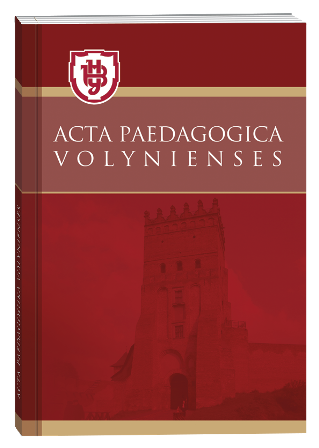SOFT SKILLS FORMATION AT THE STAGES OF PROFESSIONAL PERSONALITY
DOI:
https://doi.org/10.32782/apv/2022.1.2.32Keywords:
soft skills, periodization of education, creative education, personal development of the applicantAbstract
Recommendations for the formation of soft skills in the higher education system appeared in world practice in the 1950s, which led to significant changes in educational activities and requirements in professional activities. The problem of soft skills formation in recent years is increasingly attracting domestic researchers, this interest is largely due to changes in the education system of our country. That is why the article considers the problem of differentiation of periods of formation of creative personality, for the acquisition of soft skills. The purpose of this work is to analyze all stages of professional development of the individual and find out at which stage is the greatest formation of soft skills (flexible skills). The authors identified the basic concepts and approaches to periodization. It is established that differentiation and periodization of creative personality formation are carried out in three main interdependent areas, such as stages of professional personality formation, age periods and stages of personality formation and creative personality formation stages. All stages of professional development of the individual and emerging problems in the educational process that require appropriate creatively oriented psychological and pedagogical actions are considered in detail. Having considered in detail the stage of professional development of the individual, the authors found that it is at the stage of professional training is the acquisition and development of soft skills. It is at this stage that teachers of higher education institutions need to pay special attention to the formation of the same necessary flexible skills. The task of modern teachers is not only to help students master the necessary professional program, but also to encourage the development of certain competencies that will help them be competitive in today's labor market.
References
Калимуллин А.М., Габдулхаков В.Ф. О стратегических ориентирах развития педагогического образования в России в контексте глобальных перемен. Образование и саморазвитие. 2015. № 4 (46). С. 3–9.
Муравйова І.О., Целікова А.С. Креативна педагогіка як іноваційна галузь розвитку креативності учня. Педагогіка формування творчої особистості у вищій і загальноосвітній школах. Запоріжжя, 2020. № 70, Т. 3. С. 135–139.
Цаликова И.К., Пахотина С.В. Научные исследования по вопросам формирования soft skills (обзор данных в международных базах Scopus, Web of Science). Образование и наука. 2019. № 8, Т. 21. С. 187–207.
Brooks N.G., Greer T.H., Morris S.A. Information systems security job advertisement analysis: Skills review and implications for information systems curriculum. Journal of Education for Business. 2018. Vol 93 (5). P. 213–221.
Callier V., Singiser R.H., Vanderford N. Connecting undergraduate science education with the needs of today’s graduates. F1000 Research. 2014. No 3. P. 279.
Chamorro-Premuzic T., Arteche A., Bremner A. J. Greven C., Furnham A. Soft skills in higher education: importance and improvement ratings as a function of individual differences and academic performance. Educational Psychology. 2010. No 30 (2). P. 221–241.
Fernández-Sanz L., Villalba M. T., Medina J. A., Misra S. A study on the key soft skills for successful participation of students in multinational engineering education. International Journal of Engineering Education. 2017. No 33(6). P. 2061–2070.
Gale A.J., Duffey M.A., Park-Gates Sh., Peek P.F. Soft Skills versus hard skills: practitioners’ perspectives on interior design interns. Journal of Interior Design. 2017. No 42(4). P. 45–63.
Gruzdev M.V., Kuznetsova I.V., Tarkhanova I.Y., Kazakova E.I. University graduates’ soft skills: the employers’ opinion. European Journal of Con-temporary Education. 2018. No 7 (4). P. 690–698.
Mardis M.A., Ma J., Jones F.R., Ambavarapu C.R., Kelleher H.M., Spears L.I., McClure C.R. Assessing alignment between information technology educational opportunities, professional requirements, and industry demands. Education and Information Technologies. 2018. No 23 (4). P. 1547–1584.
Robles M.M. Executive Perceptions of the Top 10 soft skills needed in today’s workplace. Business Communication Quarterly. 2012. No 75 (4). P. 453–465.
Sisson L.G., Adams A.R. Essential hospitality management competencies: The importance of soft skills. Journal of Hospitality and Tourism Education. 2013. No 25 (3). P. 131–145.







